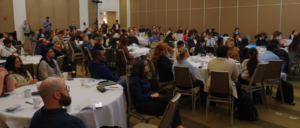Anne Gent, B.Sc., EP
Environmental Scientist
Cameco Corporation
What does it take to lead environmental change in the mining industry? Find out in EP Anne Gent’s story of her career shift from environmental consulting to mining.
Tell us about yourself! How did you start out in this industry?
I was very fortunate to get a research technician position with Environment Canada right out of university. My position involved sample collection and data management as part of a program researching mercury contamination across the Prairie Provinces and Northwest Territories. This led to a Science Horizon Internship with an environmental consulting company, which progressed into a full time position. The contacts I made in the consulting industry have played an integral part in my transition to the mining industry, which is where I work today.
What does it take for someone to succeed in your field?
You have to be flexible and approach new opportunities with an open mind. Many environmental careers progress from a support role. These early opportunities allow you to become familiar with the challenges within your field and develop techniques to address them successfully. A good grasp of regulatory requirements will also help you along the way.
How can networking help someone who is in the mid-stage of their career?
Networking is great for sharing ideas. Whether it’s asking for feedback or discussing your point of view, it will help you see things from another perspective and learn from people who have already been where you are.
What are the rewards and challenges of being a woman in a non-traditional field?
Many times you may be the only female working in a remote camp and may run up against some people who don’t believe women belong in those situations. Fortunately, over my career I have seen a transition that includes more women in non-traditional roles, as well as more acceptance from colleagues. This is a result of many years of women pushing the boundaries and proving that they have the skills and ability to do the work.
What are some environmental opportunities in the mining and uranium industry?
There is a broad spectrum of opportunities ranging from Environmental Technicians, who are responsible for the sample collections and initial data entry and interpretation, to Environmental Managers, who are responsible for overseeing the environmental and regulatory programs for large operations. Many positions within the mining and uranium industry have an environmental component, as do many of the organizations responsible for regulating the industry such as the Ministry of Environment, Environment Canada, and the CNSC.
How can field work in research or consulting help you get valuable experience before a shift into an office role?
The ability to know what your crews are facing when they are in the field is invaluable when planning and budgeting for a program. When an alteration to the study design is needed due to field conditions, you are in a better position to defend the change to regulators.
How can the EP designation assist someone who does not have a Master of Science or other professional designation?
Although not everyone pursues higher education, the EP designation, much like a P.Eng or other professional designations, allows others to be confident that you are committed to your work and professional development. Check; Kroger Weekly Ad, ALDI Weekly Ad, ALDI Catalogue, IGA Catalogue, Meijer Weekly Ad, Publix Weekly Ad, Coles Catalogue, Supercheap Auto Catalogue, CVS Ad.



